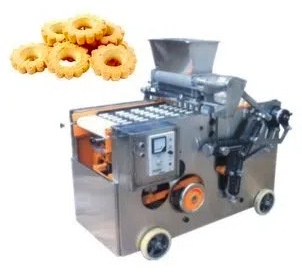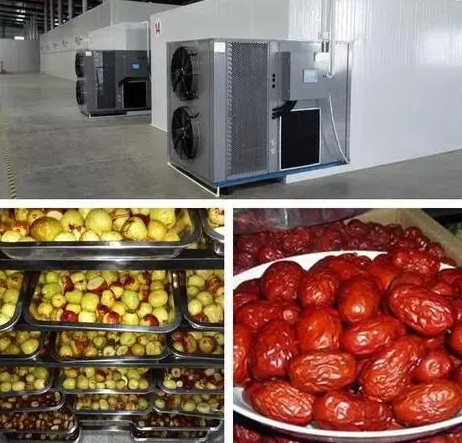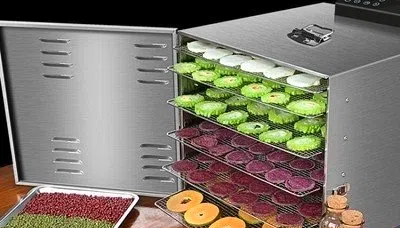
Content Menu
● Understanding Commercial Heat Pump Dryers
● Energy Efficiency
● Preservation of Nutritional Value
● Versatility in Food Products
● Environmentally Friendly
● Improved Product Quality
● Cost-Effectiveness
● User-Friendly Operation
● Conclusion
● Frequently Asked Questions
>> 1. What types of food can be dried using a commercial heat pump dryer?
>> 2. How does a heat pump dryer differ from traditional dryers?
>> 3. Are commercial heat pump dryers environmentally friendly?
>> 4. What is the average lifespan of a commercial heat pump dryer?
>> 5. How can I ensure the best results when using a heat pump dryer?
In the food processing industry, the drying process is crucial for preserving the quality, flavor, and nutritional value of food products. As a leading manufacturer of food drying machines in China, we specialize in providing OEM services to international brands, wholesalers, and producers. One of the most effective technologies in this field is the commercial heat pump dryer. This article explores the numerous benefits of using a commercial heat pump dryer for food drying, highlighting its efficiency, sustainability, and versatility.

Understanding Commercial Heat Pump Dryers
Commercial heat pump dryers utilize advanced technology to remove moisture from food products. Unlike traditional drying methods that rely on direct heat, heat pump dryers operate by circulating warm air within a closed system. This process not only enhances energy efficiency but also ensures that the food retains its essential nutrients and flavors.
Energy Efficiency
One of the most significant advantages of commercial heat pump dryers is their energy efficiency. These dryers can operate at lower temperatures compared to conventional dryers, which reduces energy consumption. The heat pump system recycles the heat generated during the drying process, making it possible to achieve optimal drying conditions without excessive energy use.
For businesses looking to reduce operational costs, investing in a commercial heat pump dryer can lead to substantial savings on energy bills. This is particularly important in the food industry, where energy costs can significantly impact overall profitability.
Moreover, the energy efficiency of heat pump dryers contributes to a lower carbon footprint, aligning with global efforts to promote sustainable practices in food production. As consumers become more environmentally conscious, businesses that adopt energy-efficient technologies can enhance their brand image and attract a broader customer base.
Preservation of Nutritional Value
When it comes to food processing, maintaining the nutritional value of products is paramount. Commercial heat pump dryers excel in this area by providing a gentle drying process that minimizes the degradation of vitamins and minerals. The lower drying temperatures help preserve the natural color, flavor, and texture of the food, resulting in high-quality dried products.
In addition to preserving nutrients, heat pump dryers also help maintain the sensory qualities of food. For instance, dried fruits retain their vibrant colors and appealing textures, making them more attractive to consumers. This is particularly important in the competitive snack market, where visual appeal can significantly influence purchasing decisions.
Versatility in Food Products
Commercial heat pump dryers are incredibly versatile and can be used to dry a wide range of food products, including fruits, vegetables, herbs, and meats. This adaptability makes them an ideal choice for food manufacturers looking to diversify their product offerings.
For instance, fruits like apples, bananas, and strawberries can be dried to create healthy snacks, while vegetables such as carrots and bell peppers can be preserved for use in soups and stews. Additionally, heat pump dryers can be used to produce dried herbs and spices, enhancing the flavor profiles of various dishes.
The versatility of heat pump dryers also extends to their ability to handle different drying methods. For example, they can be used for batch drying or continuous drying processes, depending on the production needs of the manufacturer. This flexibility allows businesses to optimize their operations and respond quickly to market demands.
Environmentally Friendly
Sustainability is a growing concern in the food industry, and commercial heat pump dryers align with eco-friendly practices. By consuming less energy and reducing greenhouse gas emissions, these dryers contribute to a more sustainable food processing operation.
Moreover, the closed-loop system of heat pump dryers minimizes the release of moisture into the environment, reducing the risk of mold and other issues associated with traditional drying methods. This environmentally conscious approach not only benefits the planet but also enhances the reputation of businesses committed to sustainable practices.
In addition to their energy efficiency, heat pump dryers often use refrigerants that have a lower environmental impact compared to those used in conventional drying systems. This further supports the goal of reducing the overall ecological footprint of food processing operations.
Improved Product Quality
The quality of dried food products is essential for consumer satisfaction. Commercial heat pump dryers provide consistent drying results, ensuring that each batch of food is dried uniformly. This consistency helps prevent issues such as over-drying or under-drying, which can negatively impact the taste and texture of the final product.
Additionally, the ability to control temperature and humidity levels during the drying process allows manufacturers to tailor the drying conditions to specific food products. This level of control results in superior quality dried foods that meet consumer expectations.
Furthermore, the advanced technology used in heat pump dryers often includes features such as automatic moisture detection and adjustment. This ensures that the drying process is optimized for each specific product, leading to better quality and reduced waste.

Cost-Effectiveness
While the initial investment in a commercial heat pump dryer may be higher than traditional drying equipment, the long-term cost savings make it a wise choice for food manufacturers. The energy efficiency of heat pump dryers leads to lower operational costs, and their durability ensures a longer lifespan compared to conventional dryers.
Moreover, the ability to produce high-quality dried products can open new market opportunities and increase revenue. Businesses that invest in commercial heat pump dryers often find that the benefits far outweigh the initial costs.
In addition to direct cost savings, heat pump dryers can also reduce labor costs. Their automated features and user-friendly designs minimize the need for constant supervision, allowing staff to focus on other critical tasks within the production process.
User-Friendly Operation
Modern commercial heat pump dryers are designed with user-friendliness in mind. Many models come equipped with advanced control systems that allow operators to easily set and monitor drying parameters. This ease of use reduces the likelihood of human error and ensures consistent results.
Additionally, many heat pump dryers feature automated cleaning systems, which simplify maintenance and reduce downtime. This user-friendly design is particularly beneficial for businesses with limited staff or resources.
Training staff to operate heat pump dryers is also straightforward, as the intuitive interfaces and clear instructions make it easy for new employees to learn the system quickly. This efficiency in training can lead to faster production ramp-up times and improved overall productivity.
Conclusion
In conclusion, commercial heat pump dryers offer numerous benefits for food manufacturers looking to enhance their drying processes. From energy efficiency and nutritional preservation to versatility and improved product quality, these dryers are an excellent investment for businesses in the food processing industry. As sustainability becomes increasingly important, adopting heat pump technology can also help companies align with eco-friendly practices.
By choosing a commercial heat pump dryer, food manufacturers can not only improve their operational efficiency but also produce high-quality dried products that meet consumer demands. As a leading manufacturer of food drying machines in China, we are committed to providing innovative solutions that help our clients succeed in the competitive food industry.

Frequently Asked Questions
1. What types of food can be dried using a commercial heat pump dryer?
A commercial heat pump dryer can be used to dry a variety of food products, including fruits, vegetables, herbs, and meats.
2. How does a heat pump dryer differ from traditional dryers?
Heat pump dryers operate at lower temperatures and recycle heat, making them more energy-efficient and better at preserving the nutritional value of food compared to traditional dryers.
3. Are commercial heat pump dryers environmentally friendly?
Yes, they consume less energy and reduce greenhouse gas emissions, contributing to more sustainable food processing practices.
4. What is the average lifespan of a commercial heat pump dryer?
With proper maintenance, a commercial heat pump dryer can last for many years, often outlasting traditional drying equipment.
5. How can I ensure the best results when using a heat pump dryer?
To achieve optimal results, it is essential to monitor and control the drying parameters, such as temperature and humidity, based on the specific food product being dried.












